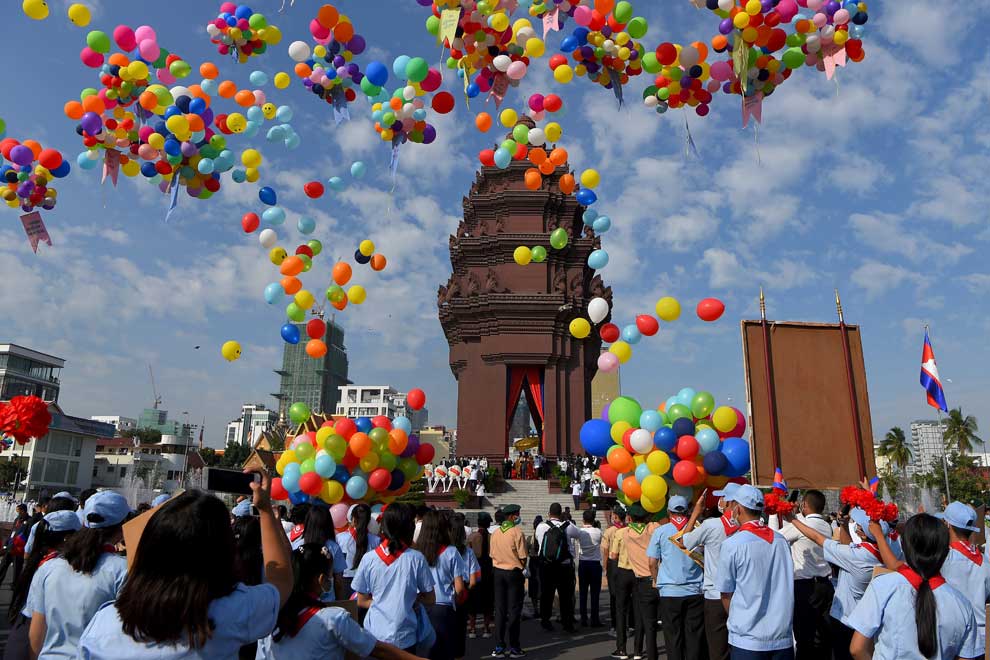
Balloons are released at the Independence Monument during a ceremony marking Cambodia’s Independence Day in Phnom Penh on November 9. AFP
Members of the Senate and National Assembly, government officials, the Royal Cambodian Armed Forces (RCAF), diplomats and students gathered at Independence Monument in Phnom Penh on November 9 to celebrate Cambodia’s 67th Independence Day.
The late King Father Norodom Sihanouk achieved independence from the French on November 9, 1953.
King Norodom Sihamoni attended the royal ceremony, which also marked the birthday of the RCAF.
Prime Minister Hun Sen did not join the ceremony as he remained in quarantine.
In a Facebook post, he said people should be reminded of the King Father’s mission to help the country and Khmer people and his wisdom and struggles to demand true independence for Cambodia.
Kem Sokha, former leader of the Supreme Court-dissolved Cambodia National Rescue Party (CNRP) who is barred from political activities while awaiting trial on treason charges, also posted his congratulatory message but questioned whether the country was truly independent given what he called a lack of national unity.
Sohka cited a Royal Message of the King Father dated November 9, 1962: “To protect independence, national unity must be strong. Maintaining strong unity cannot be accomplished unless personal ambition is put away. Do not seek revenge, forgive each other, start to have a conversation, give up insulation, stop endless disputes.”
“I would like to pray for Cambodia and real independence,” he said.
Kin Phea, director of the Royal Academy of Cambodia’s International Relations Institute, said the congratulatory display put on by politicians, even on the opposing sides, shows national unity, independence and sovereignty.
“This serves to remind Cambodians about the value of independence. When there are internal problems, we should join each other to solve them. We should not depend on foreigners to interfere in our internal issues and shout we love independence,” he said.

King Norodom Sihamoni arriving at the ceremony celebrating Cambodia’s Independence Day on November 9. AFP
Political analyst Lao Mong Hay told The Post that Independence Day was a special day for Cambodians to unite and live as a nation.
He said Cambodia had lost its independence, sovereignty and territory and suffered many times since the Siam (Thailand) invasion in the late 16th century. It has been ruled by Siam, the Dai Viet kingdom, France, Japan and Vietnam, he said.
Mong Hay said some people used to call Cambodia a puppet state of Japan between March and October 1945. Cambodia was also called a puppet state of Vietnam from January 1979 to October 1991. The Khmer were once divided by the Siam and Dai Viet, and dominated by the French.
“After realising the loss of national independence and the tragedy of the Cambodian nation, we should be determined to work together not to lose our independence again.
“We commit that we are the same Cambodian people. We do not consider any Cambodian an enemy, even in the face of competition for power. Such a joint commitment is to strengthen national unity, and this national unity will strengthen national independence,” he said.
Cambodian Centre for Human Rights (CCHR) executive director Chak Sopheap said Cambodia should solve its problems on its own by establishing a national dialogue and upholding national interests, sustainable development, mutual tolerance and social equality.
“Politicians should do good things for the next generation and open up opportunities for people of all levels to enjoy in the streets, in embassies and at home, both inside and outside the country, as other countries have celebrated without fear or threat,” she said.











